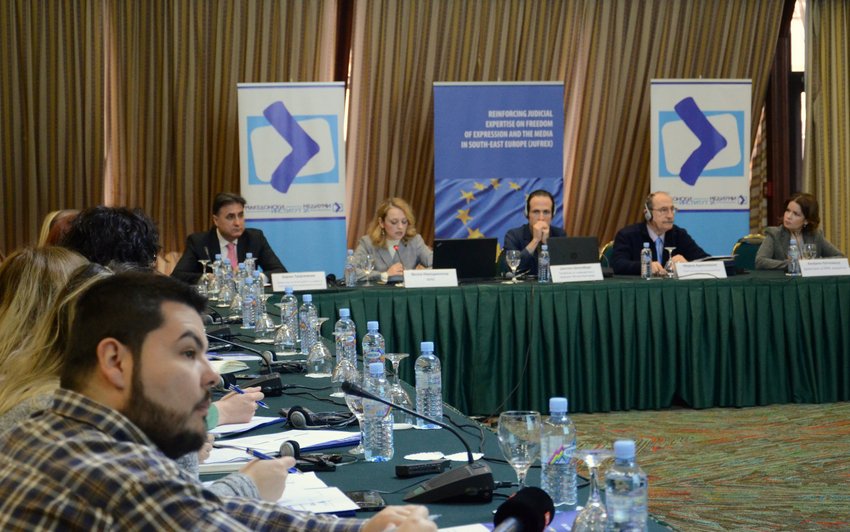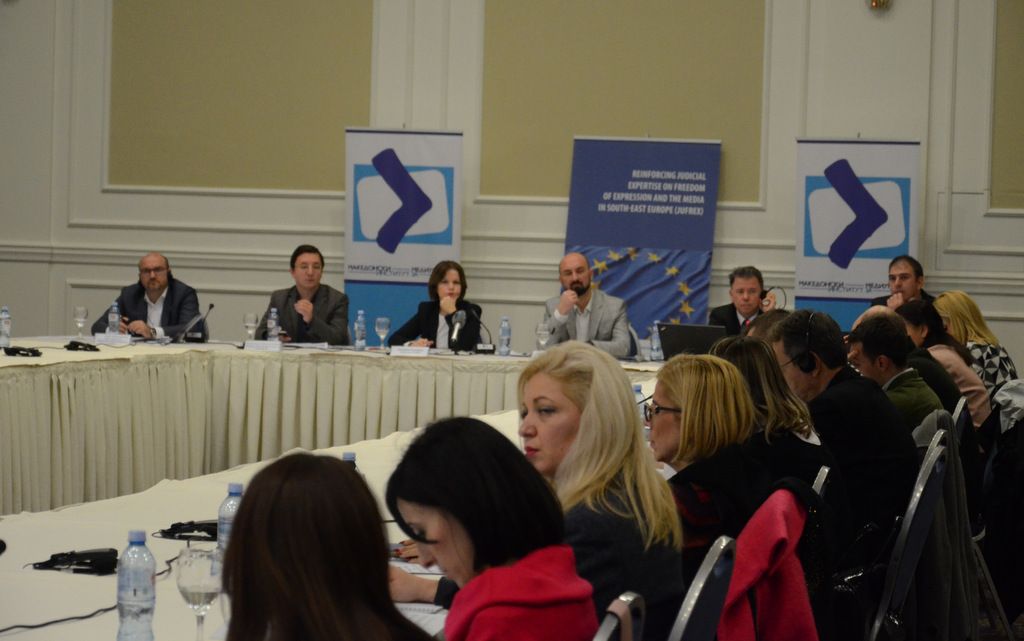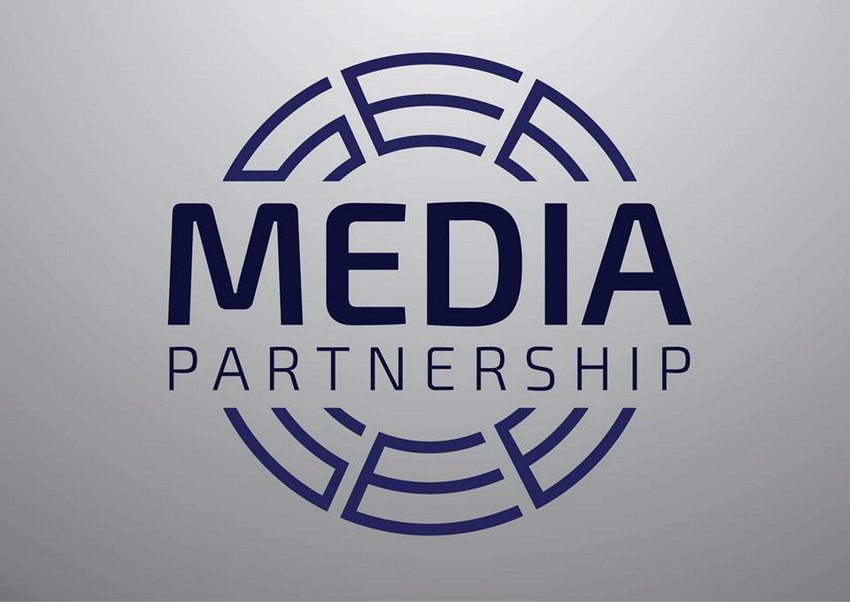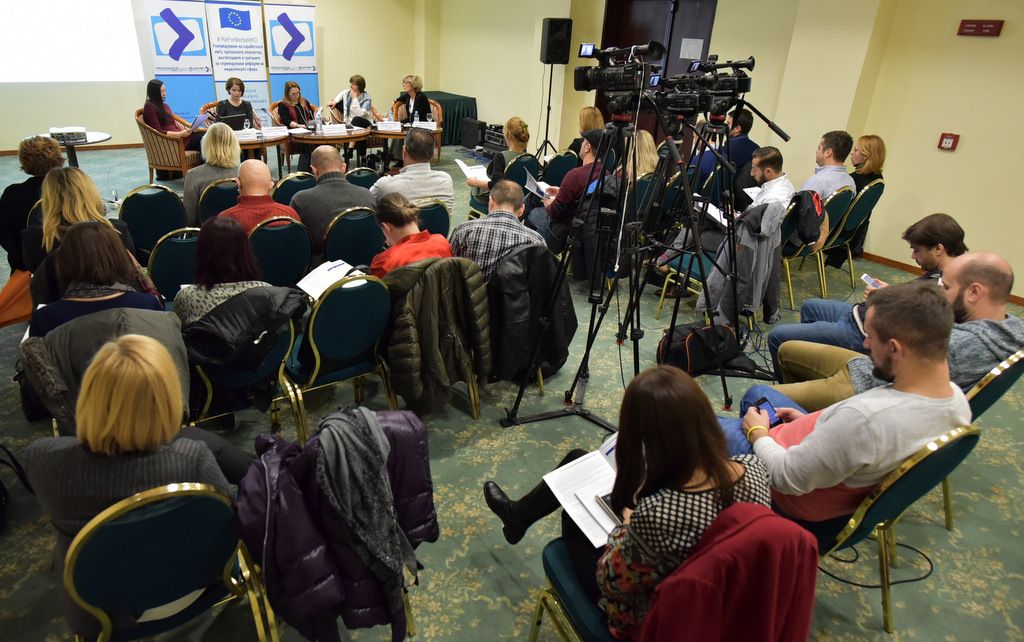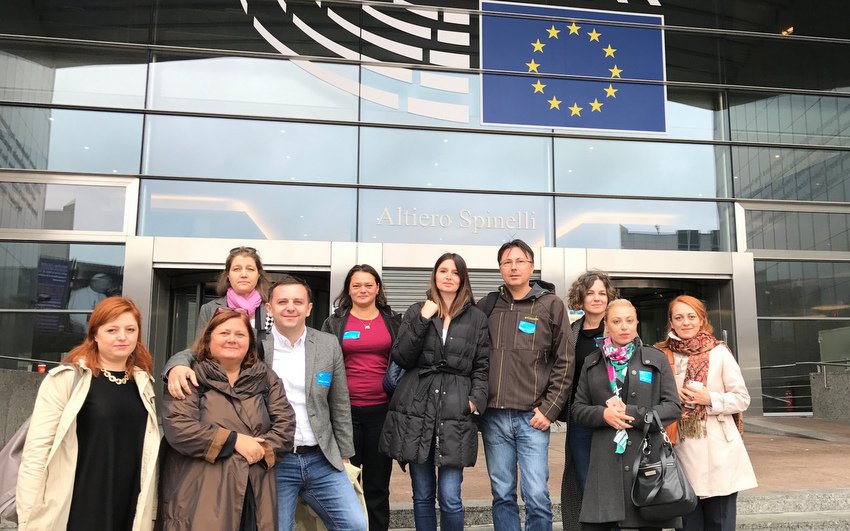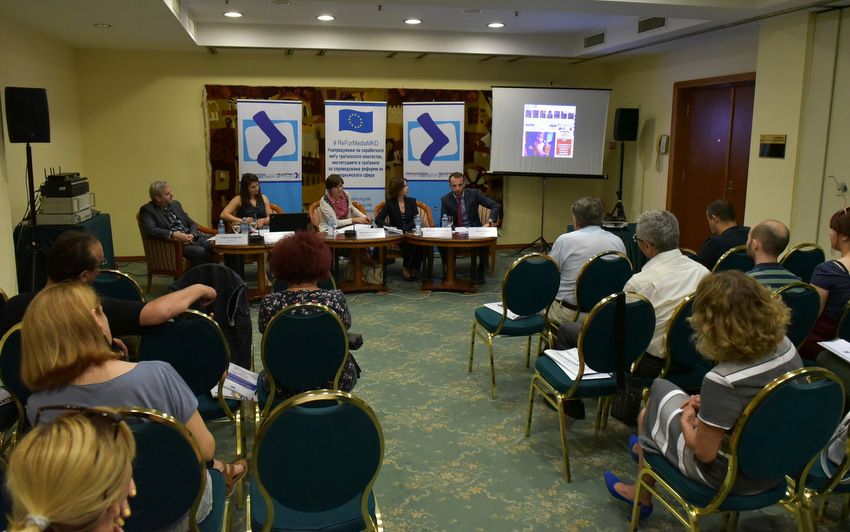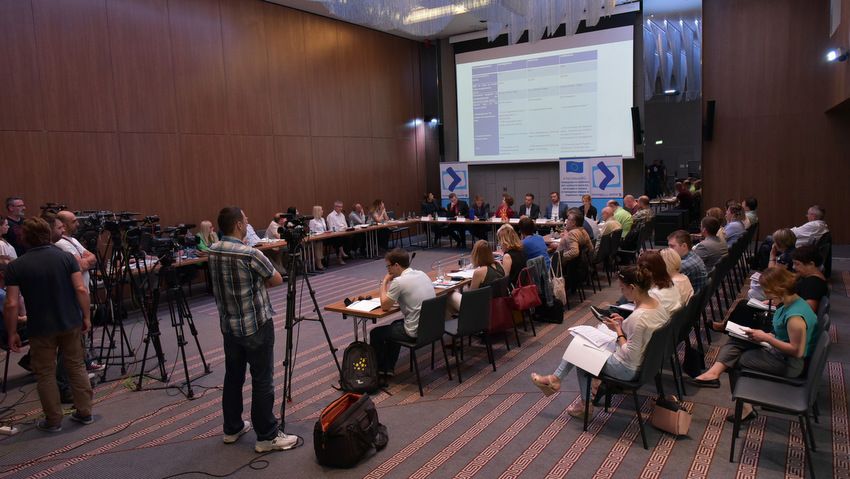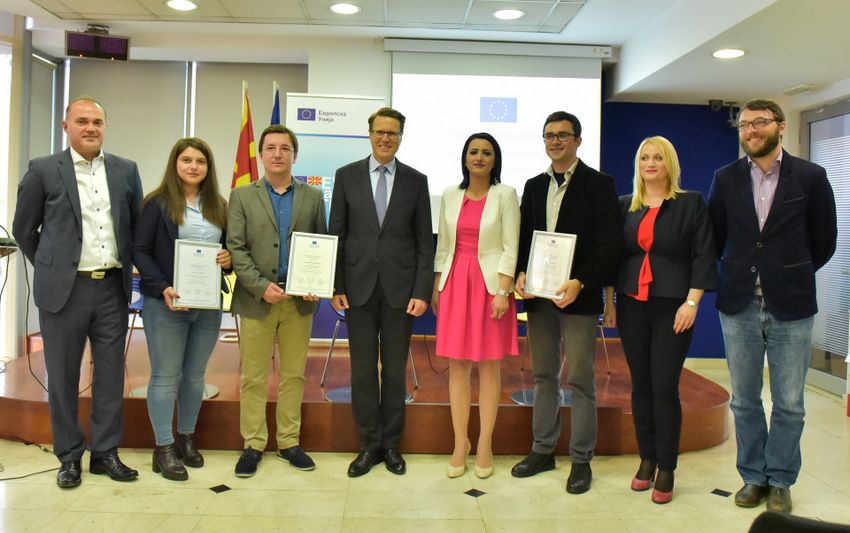Political pluralism in the media is a complex topic whose encouragement depends on the inclusion of multiple relevant stakeholders and various participating mechanisms. Consistent application should be allowed for the legal regulation, all institutions and authorities with competences in the area should work together and consistently enforce their obligations, the self-regulatory body should continue their efforts and the media should reinforce their support for its work. Media and citizens organizations should exert pressure into promoting this goal by also incorporating this issue in the educational system as a value which shall receive commitment of new generations of journalists and media workers. It is especially important to reinforce awareness with the media and media owners, editors and journalists, as well as with political elites who need to demonstrate democratic capacity and leave the media to function independently.
These were some of the crucial points raised at the conference "Political pluralism in media reporting in the period outside of election campaign” organized by the Macedonian Institute for Media in cooperation with the Council of Europe.
The Macedonian legislation does not foresee any rules or norms related to ensuring political pluralism beyond election period, while in election period this topic is regulated by the Election Code. "Beyond elections, the greatest burden, or responsibility, lies with media editors and owners. Following the change of government (in 2016), there were changes in the way the media report. However, the question remains whether with a future change in government, the media would continue to report in favour of a certain political party," said Zoran Trajcevski, director of the Agency for Audio and Audio-Visual Medial Services.
According to the president of the Complaints Commission within the Media Ethics Council of Macedonia, Mirce Adamcevski, the situation with political pluralism in the media is currently a little improved, bot not sufficiently: "Televisions with national licences are attentive to the respect for political pluralism, but they are not always successful. It can still be said that the media work is influenced by their owners in conjunction with the editors-in-chief, lucratively related with some of the political parties. There still is pronounced political pluralization in the media depending on their owners /.../ a separate story in the (dis)respect for political pluralism in the media is the public broadcaster. It has always been directed by the governing political parties. Hence, it needs drastic change."
The expert from the United Kingdom, Justin Schlosberg, a professor at the Birkbeck University in London, said that sourcing from the situation in his country, he could recommend to set up an independent commission on pluralism which would thoroughly consider all issues influencing political pluralism in the media: '...not only related to impartiality or lack of impartiality, but viability of various types of media, various voices heard in the media, it should be ensured that audiences are in their integrity exposed to a variety of opinions expressed in the media." In his opinion, said commission would recommend the government and assembly proposed changes with regards to all issues specific to a national context, such as how the regulator is funded and constituted, what their obligations are, with regards to the net neutrality, subsidy of not-for-profit media, etc.
The conference was held within the project ‘Reinforcing judicial expertise on freedom of expression and the media in South-East Europe (JUFREX)' co-funded by the European Union.
The presentation of the UK expert, Justin Schlosberg, is attached herewith.
Photo gallery of the event is available here.
News
It is necessary to find effective mechanisms to intensify cooperation between the media and the judicial authorities in order to improve their communication and establish their mutual trust. The foregoing was the joint conclusion arrived at by representatives of the press, judges and prosecutors at the conference 'Media reporting on court proceedings' organized by the Macedonian Institute for the Media in cooperation with the Council of Europe.
The aim of the conference was to enable the exchange of experience and positions among representatives of the judicial authorities and the press with regards to media reporting about court proceedings and consider opportunities for the improvement of their communication and cooperation for the purpose of informing the public on time and with due quality concerning issues from the sphere of the public interest.
Mr. Frédéric Grass, an international expert and a lawyer from Paris, addressed in his presentation the standards contained in the Recommendation of the Council of Europe referring to the supply of information through the media about criminal procedures, as well as the Declaration on Media Reporting with regards to criminal procedures. He stressed the right of the press to criticize the judiciary, but also emphasized that representatives of the state authorities are expected to have higher tolerance to criticism. During his address, Mr. Grasse said that when reporting from criminal proceedings, journalists should 'use a suitable vocabulary'; comply with the relevant ethical standards by presenting facts from sources, thereby respecting the rule on the presumption of innocence, the right to privacy and the respect for the dignity and security of all stakeholders in the court proceedings.
According to Aleksandar Dimitrievski, a journalist who specializes in the judicial matters under the 360 Degrees programme on Alsat TV, there still exists some mistrust among journalists, judges and prosecutors; justice authorities lack higher levels of transparency, they are rarely transparent when it comes to comments to their decisions and actions in the media, and he emphasized that there are journalists who do not know sufficiently the procedures and the laws. He proposed several recommendations that would make the work of the journalists easier, would improve communication between the courts and the journalists, and the overall transparency of the courts: 'Professionalization of spokespersons and their promotion into people who will be more than mediators between the journalists and judges; establishment of a functional mechanism for sanctioning judges who refuse to cooperate with the public; the holding of regular press conferences and briefing sessions by the court presidents and the heads of the prosecution offices, publicly available indictments from cases of public interest, as well as regulating the issue of recording in the court room."
Judge Nenad Saveski from the Basic Court Skopje 1 agreed that it is necessary to improve communication with the journalists, whereas greater mutual trust would be established. According to judge Saveski, the courts will be able to demonstrate greater independence through their cooperation with the media. Judge Saveski claims that criticism from journalists to the 'silence', i.e. alleged non-transparency of the courts with regards to actions within specific cases in the realm of public interest stems from 'prudent behaviour' on the part of judges, as well as from a series of legal limitations such as the presumption of innocence, protection of privacy, safekeeping of the security and dignity of the participants in the process, preserving the reputation of the court, etc. He went on to explain that the courts perform their PR function through press releases and spokespersons and he agreed that both professions should have more frequent meetings for purposes of improving their cooperation.
The public prosecutor Jovan Cvetanovski, from the Higher Prosecutor's Office in Skopje, also agreed that the public should be informed through the media and all reporters requesting information should obtain it. He proposed that regular briefing sessions should be held with the journalists in order to improve communication of the prosecution office with the public and increase trust in the institutions.
The conference was held within the project ‘Reinforcing Judicial Expertise on Freedom of Expression and the Media in South-East Europe (JUFREX)' co-funded by the European Union.
Find enclosed the presentation of the international expert Mr. Frédéric Grass, as well as the recommendation and declaration of the Council of Europe on the subject of reporting on criminal procedures.
Transparency of judicial authority media coverage of court proceedings641.22 KB
The South East European Partnership for Media Development Project ends today, after four years of hard but rewarding work by partners in Albania, Bosnia and Herzegovina, Macedonia, Montenegro, Serbia, Bulgaria and Romania. It brought together journalists, media centers and institutes, trade unions, CSOs, academics and policy makers whose combined efforts aimed at the development of independent and accountable media in the Western Balkans.
"It was a tremendous journey. We analyzed the lives of journalists and faced the challenges they face, all over the region. We tapped into positive energies but also hit obstacles more or less visible. We wish we could say that we find the region in a better state than four years ago. This is not the case. The threats to media freedom and independence are even more serious and the need for good, responsible journalism is bigger than ever. Good journalism needs not only good professionals and employers, but also good public, educated and willing to consume and support truth and transparency", said Ioana Avădani, director of the Center for Independent Journalism in Bucharest and project manager.
Under the project, the partners produced two overarching regional studies: one on the labour relations in the media in the region and a second one focusing on media literacy and education. The studies have been discussed at national and regional level by hundreds of journalists and scholars and resulted in policy recommendations. The partners also monitored the freedom of expression in the region and produced a series of studies addressing issues such as the hate speech on religious grounds, the digitalization of the media or the role of social media in setting up the public agenda.
"The project may end, but it will continue to produce results. We raised awareness of issues less addressed, we increased the advocacy capacities of media organizations, we put topics on the public agendas in the countries we worked in. It is important for our work to continue, for more and more stakeholders to join their efforts in protecting the freedom of expression, in all its forms", concluded Avadani.
SEE Partnership for Media Development was implemented by a consortium coordinated by the Center for Independent Journalis, (Romania) and composed of: Albanian Media Institute, Mediacenter for Media and Civil Society Development (BiH), Media Initiatives – Association for Media Development and Promotion of Professional Journalism (BiH), Macedonian Institute for Media (Macedonia), Montenegro Media Institute (Montenegro), Foundation Media Center (Serbia), Media and Reform Centre Nis (Serbia), Media Development Center (Bulgaria). Media professionals from Kosovo and Turkey were also involved. More information about the project is available at: https://seemediapartnership.cji.ro/
The Project was co-financed by the European Commission, the Civil Society Facility, Media Freedom and Accountability Programme, Europe Aid/134613/C/ACT/MULTI
It is necessary to open a public discussion regarding the thorough reform of all aspects of operation of the public service broadcaster, Macedonian Radio-Television (MRT), and the future development of this broadcasting-house, in order to transform it into a modern European public service. The election of members to the Public Service Programming Council should be conducted through an open public competition in order to reduce direct political influences. Moreover, all stakeholders should consider the option of a possible increase in the number of members in this body, in order to ensure a more appropriate representation of the various segments and interests in the Macedonian society. In addition, the direct entry of certain members, the reviewing of the ban on participation of public service employees in the Programming Council, as well as the introduction of the so-called staggered term of the members should also be taken into consideration. MRT should promote transparency in its work and develop channels and mechanisms for communicating with the audience.
These are the main recommendations from the comparative analysis of the Programming Councils of the public service broadcasters of Macedonia, Croatia and Slovenia, prepared by Ms. Ljiljana Mitevska, MA, presented at the public debate “Depoliticisation of the MRT Programming Council - a prerequisite for the independence of the public service", organized by the Macedonian Institute for Media. Current and former members of the Programming Councils of the Public Service Broadcasters in Macedonia, Slovenia and Croatia participated in the event as speakers.
Snezhana Klincharova, the President of the MRT Programming Council, noted that by abolishing the broadcasting fee, which is contrary to the recommendations of the European Broadcasting Union (EBU), the independence of MRT could be at stake. According to her, with the new manner of 0.5% funding allocated from the state budget for 2017, there would be less funding for this broadcasting-house in comparison to 2016, which would also be reflected on the programme quality. In addition, Klincharova highlighted the problem arising from the agreement between the political parties “Przhino 2”, by which the second channel of MTV should be completely transformed into an Albanian language programming service, the launching of which, according to the analysis, would require EUR 5 million.
For Brankica Petković, a representative from the RTV Slovenia Programming Council, “the lack of transparency in the work of this body is absolutely unacceptable”. “The sessions of the Programming Council of RTV Slovenia are announced, and the session is publicly broadcasted. Our task is to react if something is wrong and if certain ethical working standards have been violated. We should not send a signal to the citizens that everything could be broadcast, because that violates the reputation of the public service broadcaster, and consequently the confidence in the PBS”, said Petković. According to her, it is very important for the president of this body to be a person with integrity, high ethical and moral values and high intellectual potential.
According to the experience in both Slovenia and Croatia, the abolition of the broadcasting fee and the financing of the public service broadcaster from the state budget is not a good solution. “If necessary, this can be a temporary solution, until a stable and lasting solution is found. Both Slovenia and Croatia testify that 90% of citizens pay the fee. Paying a broadcasting fee is like paying for education or health benefits. In this was you pay for the protection of journalists in the public service. RTV Slovenia has its own fee collection service. Still, the public service broadcaster must not spread ‘venom’”, warned Petković.
The participant from Croatia, Mirjana Rakić, who is the former President of the Croatian regulatory body, as well as former director and editor of HRT, believes that “a connection should be established between the citizens and the public service broadcaster”, so that the citizens see the PSB as their own, and consequently have confidence in it and thus protect it. She informed that HRT’s Programming Council has no influence on the programme, i.e. they can only debate, and the Ombudsman only has an advisory role. Both Petković and Rakić agreed that the decision where the Director General is elected by the Assembly, as is the case in Croatia, was not a good model that met European standards.
The analysis and the debate are part of the project “#ReFormMedia - Improving Cooperation among Civil Society Organizations, Institutions and Citizens for Conducting Reforms in the Media Sphere”, implemented by the Macedonian Institute for Media and the Peace Institute from Ljubljana, and financed by the European Union.
The full analysis report is hereby enclosed.
Photo gallery of the event is available here.
Comparative analysis of the Programming Councils of the PSB1.82 MB
The inefficiency of the media markets, the non-transparent financing of the media, especially from public sources, the endangering of media freedoms and rights of journalists, the growing trend of fake news and media literacy as one of the ways to deal with them, are in the focus of interest of both European institutions and European media organizations that monitor the development of the media landscape in the Western Balkan countries.
This was emphasized at several meetings with European MPs, high representatives of European institutions and several international media organizations in Brussels, with whom the representatives of media organizations from the region met as part of their advocacy visit on October 10 and 11 2017. This activity is part of the project “Partnership for Media Development in Southeast Europe".
Media organizations from the region, including the Macedonian Institute for Media, had meetings with MEP Renate Weber, Principal Adviser for Civil Society and Media at the DG NEAR, Andris Katheris, with representatives from the DG CNECT and with several international journalist and media organizations - the European Federation of Journalists, EAVI and the Global Media Development Forum.
At the meetings, the situation with the freedom of the media at Western Balkans was presented, as well as the research on the labour rights of the journalists, as well as on the educational needs of the journalists and the media literacy of the public, which were conducted in all the countries where the activities were conducted.
The project is funded by the European Commission and is implemented by the Center for Independent Journalism from Romania in partnership with the Albanian Media Institute, the organizations Media Center and Media Initiatives from Bosnia and Herzegovina, Media Center - Belgrade and Media and Reform Center - Nis from Serbia, Montenegro Media Institute, the Macedonian Institute for Media and the Media Development Center from Bulgaria.
Comments from the Macedonian Institute of Media (MIM) and the Institute of Communication Studies (ICS) to the Draft Law on Amending and Supplementing of the Law on Audio and Audivisual Media Services (Law on AAVMS)
September 11, 2017, Skopje
Dear Mr Manchevski,
We are hereby providing you with our comments and suggestions with an aim to improve the text of the Draft Law on Amending and Supplementing of the Law on Audio and Audiovisual Media Services (Law on AAVMS)
The draft law includes most of the remarks noted in our previous reactions and proposals for amendments to the Law on Audio and Audiovisual Media Services regarding the establishment and functioning of the Agency for Audio and Audiovisual Media Services (AAVMU) and the Public Service-MRT.
We propose that the mandate of the members of the AAVMU to be valid for the duration of 6 or 7 years, without the right of a renewal (Article 15 of the Law on AAVMS). That way, it will be impossible to "tie in" the position of a member in the long run, which is still a practice in the current council (considering that with each passing of a new law, some members of the council receive a new mandate).
We consider that Articles 62a and 62b in the draft law, which refer to the political pluralism in the news, in the debates, in the daily informative and contact shows are unnecessary and should be removed. It is necessary to engage in an expert debate to determine whether and how the political pluralism in the media content can be promoted through objective, impartial and balanced informing with equal treatment of different views (Article 61 of the present Law on AAVMS).
We propose that in Article 16 of the Law on AAVMS (paragraph 2, in indents 1 and 2 – “terms of appointment”) an additional criterion should be inserted which will specify that the persons who performed or were active in the listed positions and functions in the past 5 years cannot be appointed as members of the AAVMU.
The same criterion should apply to the MRT Supervisory Board (Law on AAVMS, Article 127, indents 1 and 2), where we propose to insert a provision stipulating that persons listed below and who performed or were active in the listed positions and functions in the past 5 years cannot be appointed as members of the Board.
We believe that this will contribute to greater depolitization and departization of both the Council of the Agency and the governing bodies of MRT.
A clarification is necessary in relation to Article 29 of the Draft Law on AAVMS, which refers to Article 105, paragraph 3 of the Law on AAVMS (financing of MRT), which includes the funds generated from broadcasting audio and audiovisual commercial communications as an additional source of funds for MRT. It is necessary to specify exactly what is meant by "audio and audiovisual commercial communications", given that the draft law proposes the abolition of the broadcasting fee and the commercial advertising of the public service.
We don’t support the abolition of the broadcasting fee and we believe that the financing of the Public Service from the State Budget is not the right solution. We believe that the improvement of the programme offer as well as the departization and depolitization of MRT's governing bodies will lead to improvements of the viewing ratings, along with improvements of the collection of payments of the broadcasting fee. The broadcasting fee is actually considered as a public fee in all European countries (apart from Bulgaria, Kosovo and Montenegro). We consider that it is necessary first to determine the needs of the public service from a programme and financial standpoint and (eventually) determine the amount of funds from the budget which will be used as a one-time aid (or used during a limited time-period) to assist MRT to strengthen its technical capacities. We’d like to remind you that the 2017 amendments to the Law on AAVMS envisage a separate channel broadcasted in Albanian language, for which there is currently no financial construction.
The Parliamentary Channel should be entirely under the responsibility of the Assembly of the Republic of Macedonia. The public service should not be responsible for the editorial policy of this channel, and the channel should not be used for broadcasting programs other than content related to the work and functioning of the Assembly of the Republic of Macedonia.
Sincerely,
Macedonian Institute of MediaInstitute of Communication Studies
Legislative amendments of the existing regulations aimed at more precisely defining hate speech, developing a consistent system for prevention and repression of acts of hate speech, including the application of the practices of the European Court of Human Rights by the judicial authorities, as well as ensuring urgent changes in the media regulations by introducing sanctions for hate speech and the inciting of violence through the audiovisual programs that the regulator would process in a misdemeanor procedure, are only part of the recommendations from the analysis of the MIM “The effectiveness of the legislation for protection against hate speech” by the author Nenad Zivanovski.
The analysis was presented on the debate “How to effectively deal with hate speech”, where representatives of the civil society from Macedonia and Slovenia, as well as representatives from the lawyer's guild, took part with their speeches.
The Attorney at Law, Lazar Sandev, believes that the Public Prosecutor's Office is inactive and does not raise initiatives aimed at protecting the public interest, in cases where hate speech is used. He underlined that journalists and politicians spread hate speech, and warned that this would continue to happen until the public prosecution begins to take appropriate steps. Sandev supports the idea of changing the domestic legislation and advised to use the practice that emanates from the European Court of Human Rights, since there is no judicial practice in this area in Macedonia.
Elena Brmbeska from the Helsinki Committee for Human Rights emphasized that, according to their experience, ethnic, political and sexual orientation, as well as gender identity are the dominant foundations for outbursts of hate speech. “The Helsinki Committee regularly addresses the Public Prosecutor's Office, but the results are disappointing. In 2016, there was not a single case, and currently there is only one case in the Basic Court, which is still pending the final ruling ... “, explains Brmbeska. She stressed that they face serious problems when scheduling meetings with the Public Prosecutor's Office and suspects that they either do not recognize hate speech or they do not recognize where freedom of expression ends, and hate speech begins.
Brankica Petković from the Ljubljana Peace Institute noted that the legislation in Slovenia was more restrictive than the Constitution itself, and that the Public Prosecutor's Office was also not very proactive, although it processed more cases than in Macedonia. However, she said that it was necessary to change the awareness, and at the same time, the civil society should proactively demonstrate that no attack would go unpunished. “Still, there must be a symbiosis with the media. We should oppose hate speech with more speech deeming it unacceptable,” concluded Petković .
The debate was organized as part of the project “#ReForMediaMKD - Civil society, institutions and citizens - together in enhancing media reforms”, implemented by MIM in cooperation with the Peace Institute from Ljubljana, Slovenia, with the financial support of the European Union .
The full report of the analysis is hereby enclosed.
The photo gallery of the event is available here.
The effectiveness of the legislation for protection against hate speech3.42 MB
Unlike in Macedonia, where national commercial terrestrial TV stations are exclusively "home" owned, the most influential commercial media in Croatia and Slovenia are in the hands of international media groups such as the Central European Media Enterprises (CME) and RTL, which enables them greater independence from political and business centres of power. Neither company being an owner of the most influential TV stations in Macedonia is registered to deal in the media business as their core line of business. As opposed to that, the TV channels owned by the CME and RTL groups in Croatia and Slovenia pay particular attention to the development of their media business on various platforms to keep pace with the latest technological trends and demands of audiences.
These are some of the conclusions resulting from the analysis of the Macedonian Institute for Media "Ownership and financial models of the most influential TV channels in Macedonia, Croatia and Slovenia" presented at the conference "The future of national commercial TV channels: What is the formula to success?".
The event also hosted the presentation of the analysis "Programme diversity of the most influential TV channels in Macedonia, Croatia and Slovenia"", which resulted in the conclusion that most commercial terrestrial national TV channels in Macedonia are dominated by dull and unattractive programme containing numerous Turkish soap operas and Serbian entertainment shows with very little domestic production what is, moreover, of poor quality and non-competitive with the remaining media contents. On the other hand, in both Croatian and Slovenian TV channels prevail entertainment programmes and reality shows, as well as news editions which are among the ten most highly ranked TV contents in general according to their viewership ratings. When both countries were taken into consideration for comparison purposes in the survey, their most influential TV channels were assessed to invest heavily in their domestic production with said programmes being highly ranked on the viewership lists.
The event was opened by EU Ambassador Žbogar, who said that on relatively small media markets, the media business and regulators have specific challenges which "often open some room for influence". "This is why it is important to have transparency with the media ownership and financing. It is also important that the regulator should have the authority, capacity and mechanisms to protect its independence and professionalism," said the Ambassador. He also emphasized the role of the citizens organizations that "should speak freely and get involved in an open, inclusive and effective public discourse," as well as of the Council of Media Ethics in Macedonia, which should help and provide direction to all stakeholders in the media sphere and comply with the professional standards. "Cooperation of the media business aiming to ensure transparency of the decisions and autonomous self-correction is an important goal," added the Head of the EU Delegation.
The new Minister of Communications, Accountability and Transparency, Robert Popovski, also spoke at the conference who said that the crucial issue for him is that there should be no influence over the media and the media industry. ‘Neither the government nor the opposition should exert any influence. They should all be equally represented and the media should be equally open for the political entities, the civil society, etc.," said Minister Popovski.
At the first discussion session about the ownership and financing models of the most influential commercial national TV channels spoke the director of Kanal 5 TV, Ivan Mircevski, who is also the president of the Macedonian Media Association (MMA). He pointed to the state and the institutions as being the culprits for the distorted TV market and the unstable financial situation of the TV channels for having enabled the decrease in the criteria for obtaining licenses for national and local TV channels.
Ivan Lovreček, deputy-president of the Management of RTL, Croatia, addressed the work of RTL TV by indicating that the investment from international media groups has enabled the transfer of modern know-how, trends and standards from the media practice of the developed countries. On the other hand, the financial independence and stability, which are enabled by the international media groups, make the medium more resilient to any influences over its editorial policy.
"Commercial TV channels will show integrity, firm standing and all that it takes for a so-called political independence at the moment when they have sufficient funds to survive on the market," believes Milan F. Živković, former media policy adviser at the Ministry of Culture in Croatia. In his opinion, there is an ever more present trend of internet advertising at the expense of advertising in television. In wealthy countries such as the United Kingdom, the internet migration is already a matter of fact, whereas in countries of Central and East Europe that process is being run more slowly, added Živković.
As far as programme diversity is concerned of the most influential TV channels in the three countries, Atanas Kirovski, director and editor-in-chief of Telma TV, said that television not only has a commercial role, but also has a social responsibility when it comes to the programme it offers to the citizens. "We feel a social responsibility to show people what the Oscar winning films in 2016 were; what the winners of the Cannes and Venice film festivals were, etc.," says Kirovski. In his opinion, government advertising and disproportionate allotment of budget funds for advertising was the biggest problem faced by Telma TV on the media market in the past years.
Domestic production is something that no television can do without with audiences in Slovenia, as stated by Tomaž Perović, former news and sports director at POP TV and Planet TV. " Last year there was practically no evening without a commercial television airing at least one show from the local production," added Perović.
Lazo Petruševki, Council President of the Agency for audio and audio-visual media services, pointed that the protection and development of media pluralism are one of the core competences of the Agency. When it comes to media pluralism, Petruševki believes that there is enough room for further improvement of the media regulation, especially when it comes to the competences of the Agency Council.
This is a first conference within the project "#ReForMediaMKD - Citizens, CSOs institutions and Institutions Reforming Media in Macedonia" implemented by MIM in cooperation with the Institute of Peace from Ljubljana, Slovenia and funded by the European Union.
The reports from both analyses, as well as the presentations of the guests from Croatia and Slovenia are available below.
The photo gallery of the event is available here.
Programme diversity of the most influential TV3.51 MB
Ownership and financial models of the most influential TV3.4 MB
Ivan_Lovrecek_RTL_CRO.pdf547.01 KB
Milan_Zivkovic_CRO.pdf344.29 KB
Tomaz_Perovic_SLO.pdf74.45 KB
The journalist Aleksandar Dimitrievski won the first prize on this year’s contest “EU Award for Investigative Journalism" for the online data base and the series of texts regarding crop and livestock subsidies, which were published on the web page "Prizma". The investigative story brings to the fore comprehensive and systematised data concerning the allocation of the 3% of the state Budget on the grounds of crop and livestock production subsidies. Furthermore, it analyses the potential connection between part of the subsidies beneficiaries and the executive branch of the government and the suspicious ownership structure of certain companies which have received subsidies.
Zoran Jovanoski won the second prize for the story Ashes of Death, which was featured on the broadcast "360 Stepeni" on Alsat-M Television. The story tackles an environmental disaster, which concurrently relates to the phenomenon of dramatically increased mortality in the area of Kicevo, resulting from the operation of the thermal power station Oslomej and the inappropriate treatment of the combusted carbon ashes.
Slavica Filipovska won the prize for the best story by young investigative journalist for the story Bulgarian Passport for "Pure" Macedonia, which was featured in the broadcast "360 Stepeni" on Alsat-M Television. The story, in an authentic and original manner, reveals how in an attempt to enter the EU member states as soon as possible, the citizens perceive the procedure for obtaining Bulgarian passport and citizenship as the way to achieve it.
The awards were handed by the Head of the Delegation of the European Union, H.E. Samuel Zbogar, who highlighted that being an investigative journalist all over the world is stressful, difficult and often dangerous. “Journalists face psychological and physical threats, they are taken to court for defamation, receive insults but also small salaries. In spite of all this, they are brave and stubbornly committed to doing their job. And we cannot do less than showing our admiration for them", underlined the Ambassador Zbogar. He added that disclosure of corruption and organised crime is maybe the most difficult part, since crime has its perfidy way to hide and distort the system that should actually protect society.
Among the 32 stories from 26 authors, all featured in printed, electronic and Internet media, the winning stories were assessed with highest marks by the jury composed of: Marina Tuneva, Arta Tahiri, Lirim Dulovi, Boris Georgievski and Fatmir Aliu.
Marina Tuneva, the chair of the jury, stated that despite the fact that the stories would not have an immediate effect, the tenacity itself with which the truth is expressed would be a great success for the journalists and the newsrooms. “At the same time, we encourage the editors to support the process of writing investigative pieces, especially when a journalist had discovered corruption related topics and issues that deserve to be treated thoroughly and extensively”, Tuneva said.
In view of the fact that the majority of the stories shortlisted were well researched and addressed exceptionally important issues of public concern, the jury gave the maximum number of awards. The winning story was awarded with 4000 euros, whereas the reward for second place and for the best investigative article by a young journalist was 3000 respectively.
The jury report is hereby attached.
The photo gallery of the awarding ceremony is available here.
The jury report133.3 KB

